Enron Fraud Scandal: Corporate Governance, Ethics, and SOX Act Review
VerifiedAdded on 2023/01/06
|7
|1933
|45
Report
AI Summary
This report provides an in-depth analysis of the Enron fraud scandal, one of the most notorious corporate scandals in history. It explores the failures in ethical corporate governance, the role of fraudulent accounting practices, and the impact of the Sarbanes-Oxley Act of 2002. The report discusses how Enron's management, driven by greed and a lack of ethical principles, engaged in misleading financial reporting, leading to the company's collapse and significant losses for stakeholders. It examines the violations of corporate governance, including the misuse of special purpose entities and mark-to-market accounting, and the subsequent legal ramifications, such as the conviction of Arthur Andersen for obstruction of justice. Furthermore, the report applies ethical theories like Utilitarianism and Deontology to understand the ethical failures and proposes the use of MIS development approaches, such as the Top-down approach, to prevent future scandals. The conclusion emphasizes the importance of ethical principles and the need for adherence to corporate governance regulations to ensure corporate integrity and prevent financial disasters. The report draws from various sources and provides a comprehensive overview of the Enron scandal's causes, consequences, and lessons learned.
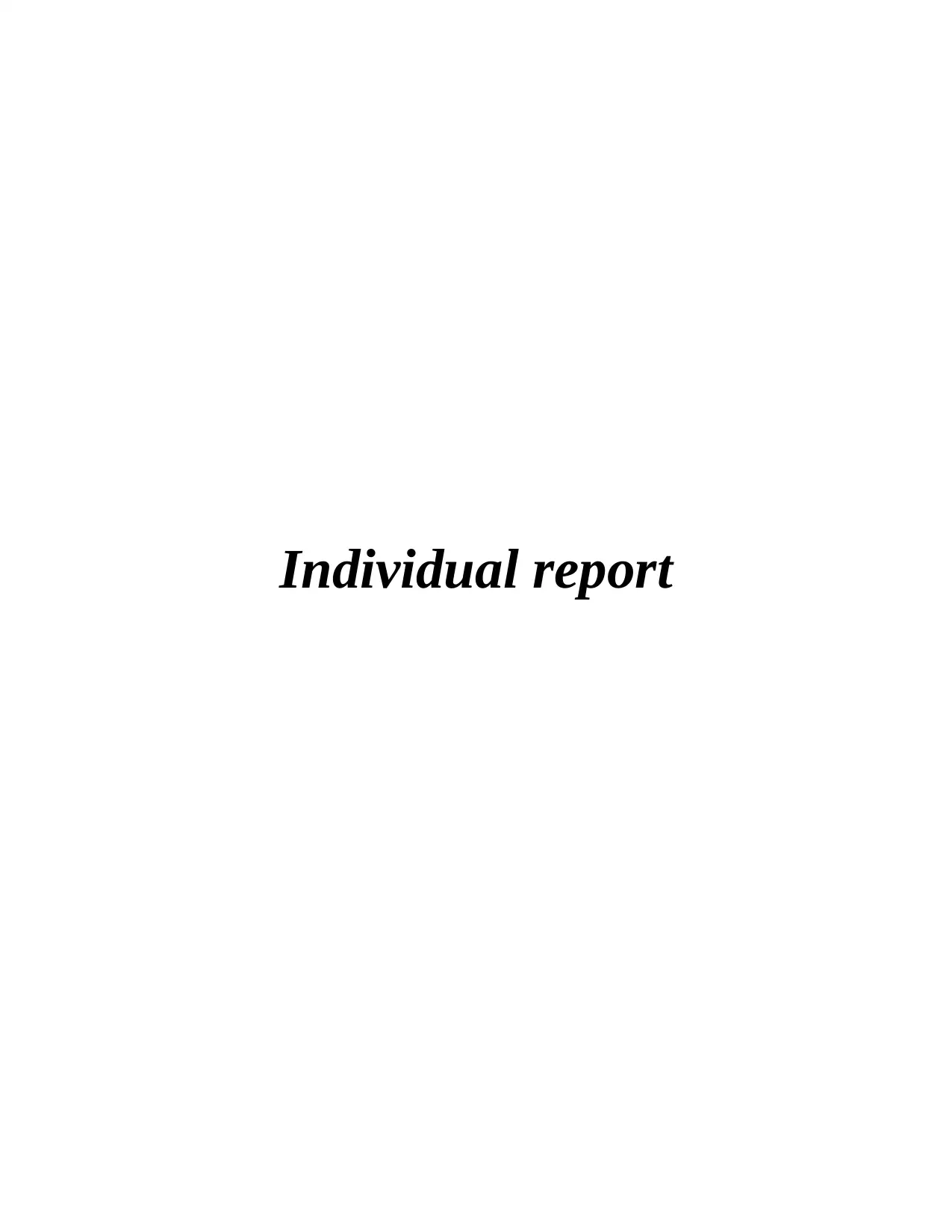
Individual report
Paraphrase This Document
Need a fresh take? Get an instant paraphrase of this document with our AI Paraphraser
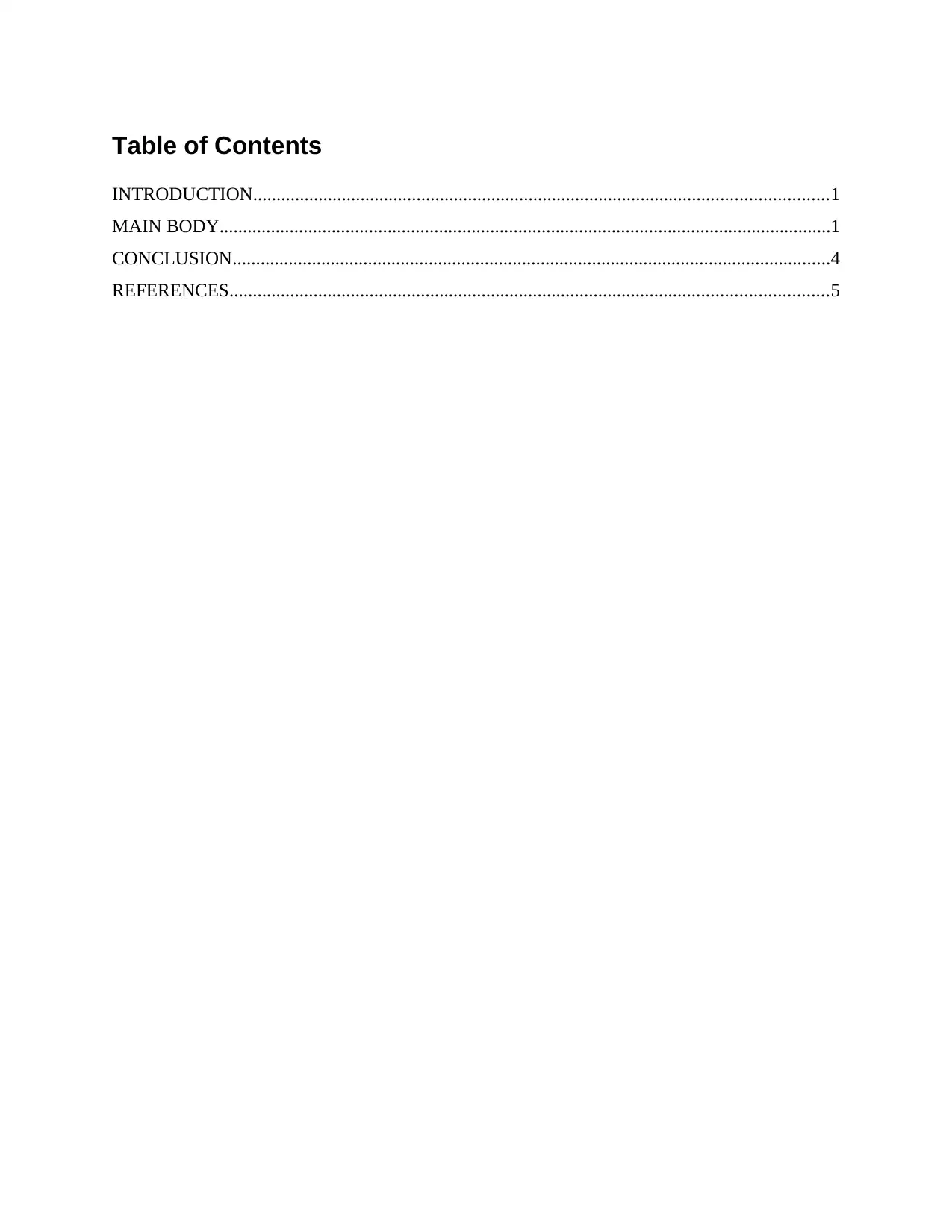
Table of Contents
INTRODUCTION...........................................................................................................................1
MAIN BODY...................................................................................................................................1
CONCLUSION................................................................................................................................4
REFERENCES................................................................................................................................5
INTRODUCTION...........................................................................................................................1
MAIN BODY...................................................................................................................................1
CONCLUSION................................................................................................................................4
REFERENCES................................................................................................................................5
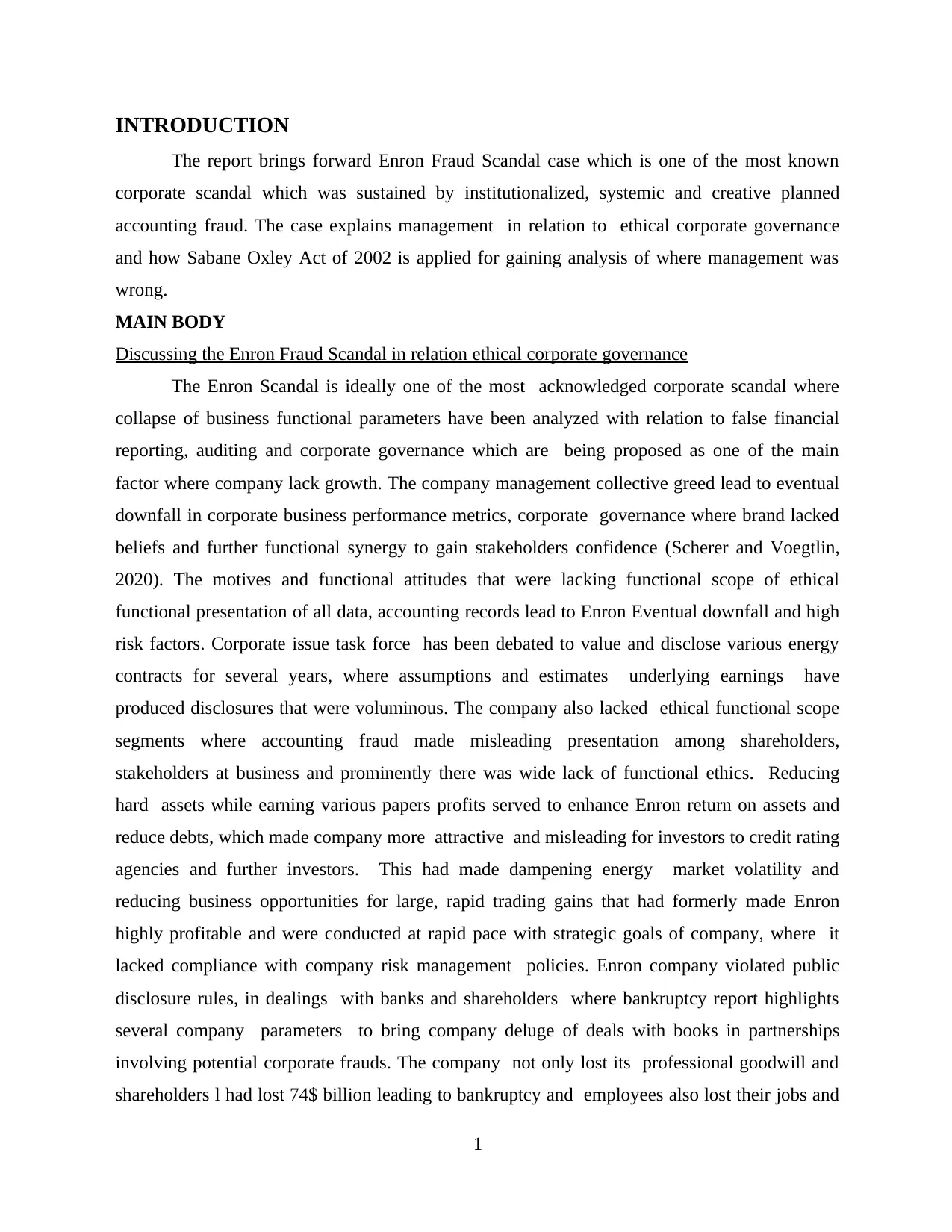
INTRODUCTION
The report brings forward Enron Fraud Scandal case which is one of the most known
corporate scandal which was sustained by institutionalized, systemic and creative planned
accounting fraud. The case explains management in relation to ethical corporate governance
and how Sabane Oxley Act of 2002 is applied for gaining analysis of where management was
wrong.
MAIN BODY
Discussing the Enron Fraud Scandal in relation ethical corporate governance
The Enron Scandal is ideally one of the most acknowledged corporate scandal where
collapse of business functional parameters have been analyzed with relation to false financial
reporting, auditing and corporate governance which are being proposed as one of the main
factor where company lack growth. The company management collective greed lead to eventual
downfall in corporate business performance metrics, corporate governance where brand lacked
beliefs and further functional synergy to gain stakeholders confidence (Scherer and Voegtlin,
2020). The motives and functional attitudes that were lacking functional scope of ethical
functional presentation of all data, accounting records lead to Enron Eventual downfall and high
risk factors. Corporate issue task force has been debated to value and disclose various energy
contracts for several years, where assumptions and estimates underlying earnings have
produced disclosures that were voluminous. The company also lacked ethical functional scope
segments where accounting fraud made misleading presentation among shareholders,
stakeholders at business and prominently there was wide lack of functional ethics. Reducing
hard assets while earning various papers profits served to enhance Enron return on assets and
reduce debts, which made company more attractive and misleading for investors to credit rating
agencies and further investors. This had made dampening energy market volatility and
reducing business opportunities for large, rapid trading gains that had formerly made Enron
highly profitable and were conducted at rapid pace with strategic goals of company, where it
lacked compliance with company risk management policies. Enron company violated public
disclosure rules, in dealings with banks and shareholders where bankruptcy report highlights
several company parameters to bring company deluge of deals with books in partnerships
involving potential corporate frauds. The company not only lost its professional goodwill and
shareholders l had lost 74$ billion leading to bankruptcy and employees also lost their jobs and
1
The report brings forward Enron Fraud Scandal case which is one of the most known
corporate scandal which was sustained by institutionalized, systemic and creative planned
accounting fraud. The case explains management in relation to ethical corporate governance
and how Sabane Oxley Act of 2002 is applied for gaining analysis of where management was
wrong.
MAIN BODY
Discussing the Enron Fraud Scandal in relation ethical corporate governance
The Enron Scandal is ideally one of the most acknowledged corporate scandal where
collapse of business functional parameters have been analyzed with relation to false financial
reporting, auditing and corporate governance which are being proposed as one of the main
factor where company lack growth. The company management collective greed lead to eventual
downfall in corporate business performance metrics, corporate governance where brand lacked
beliefs and further functional synergy to gain stakeholders confidence (Scherer and Voegtlin,
2020). The motives and functional attitudes that were lacking functional scope of ethical
functional presentation of all data, accounting records lead to Enron Eventual downfall and high
risk factors. Corporate issue task force has been debated to value and disclose various energy
contracts for several years, where assumptions and estimates underlying earnings have
produced disclosures that were voluminous. The company also lacked ethical functional scope
segments where accounting fraud made misleading presentation among shareholders,
stakeholders at business and prominently there was wide lack of functional ethics. Reducing
hard assets while earning various papers profits served to enhance Enron return on assets and
reduce debts, which made company more attractive and misleading for investors to credit rating
agencies and further investors. This had made dampening energy market volatility and
reducing business opportunities for large, rapid trading gains that had formerly made Enron
highly profitable and were conducted at rapid pace with strategic goals of company, where it
lacked compliance with company risk management policies. Enron company violated public
disclosure rules, in dealings with banks and shareholders where bankruptcy report highlights
several company parameters to bring company deluge of deals with books in partnerships
involving potential corporate frauds. The company not only lost its professional goodwill and
shareholders l had lost 74$ billion leading to bankruptcy and employees also lost their jobs and
1
⊘ This is a preview!⊘
Do you want full access?
Subscribe today to unlock all pages.

Trusted by 1+ million students worldwide
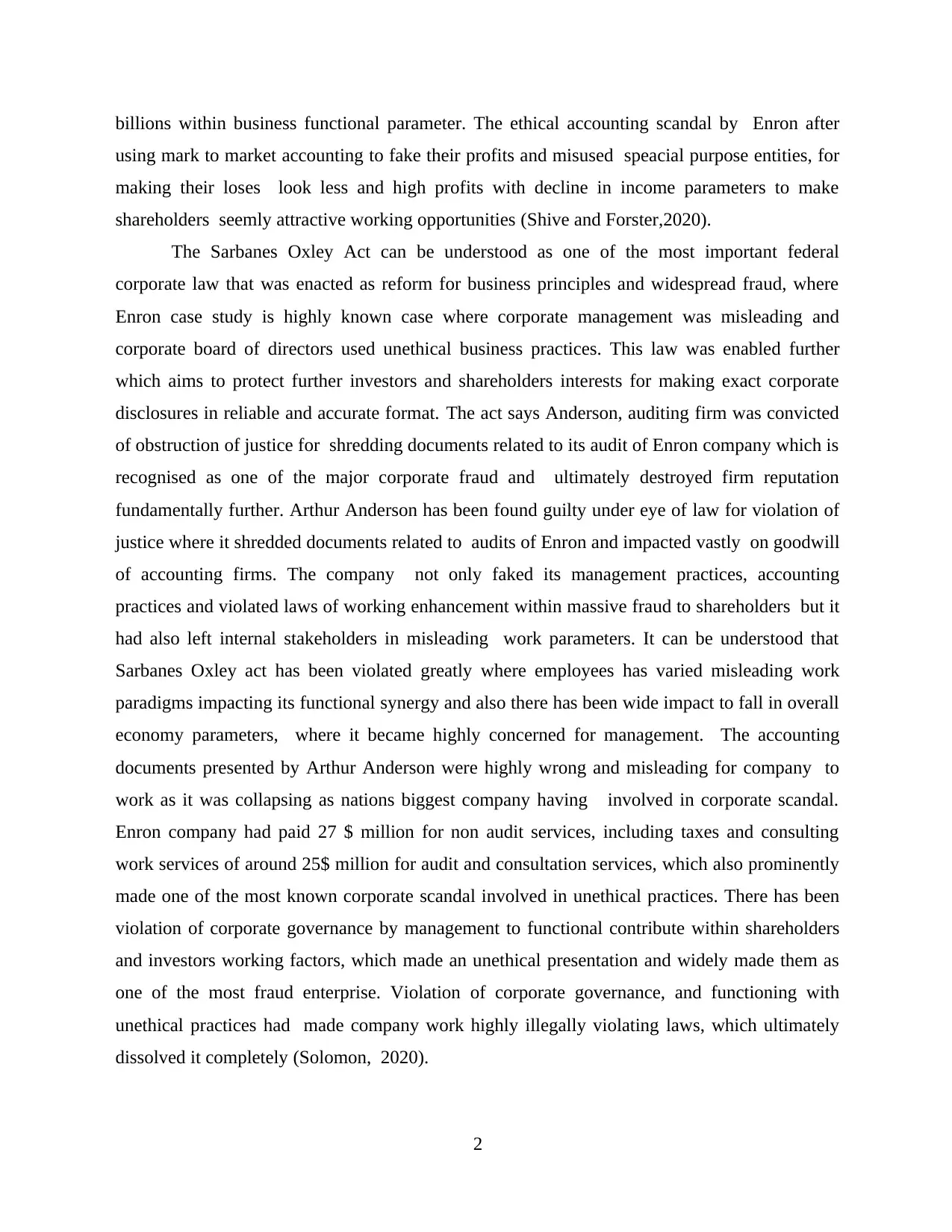
billions within business functional parameter. The ethical accounting scandal by Enron after
using mark to market accounting to fake their profits and misused speacial purpose entities, for
making their loses look less and high profits with decline in income parameters to make
shareholders seemly attractive working opportunities (Shive and Forster,2020).
The Sarbanes Oxley Act can be understood as one of the most important federal
corporate law that was enacted as reform for business principles and widespread fraud, where
Enron case study is highly known case where corporate management was misleading and
corporate board of directors used unethical business practices. This law was enabled further
which aims to protect further investors and shareholders interests for making exact corporate
disclosures in reliable and accurate format. The act says Anderson, auditing firm was convicted
of obstruction of justice for shredding documents related to its audit of Enron company which is
recognised as one of the major corporate fraud and ultimately destroyed firm reputation
fundamentally further. Arthur Anderson has been found guilty under eye of law for violation of
justice where it shredded documents related to audits of Enron and impacted vastly on goodwill
of accounting firms. The company not only faked its management practices, accounting
practices and violated laws of working enhancement within massive fraud to shareholders but it
had also left internal stakeholders in misleading work parameters. It can be understood that
Sarbanes Oxley act has been violated greatly where employees has varied misleading work
paradigms impacting its functional synergy and also there has been wide impact to fall in overall
economy parameters, where it became highly concerned for management. The accounting
documents presented by Arthur Anderson were highly wrong and misleading for company to
work as it was collapsing as nations biggest company having involved in corporate scandal.
Enron company had paid 27 $ million for non audit services, including taxes and consulting
work services of around 25$ million for audit and consultation services, which also prominently
made one of the most known corporate scandal involved in unethical practices. There has been
violation of corporate governance by management to functional contribute within shareholders
and investors working factors, which made an unethical presentation and widely made them as
one of the most fraud enterprise. Violation of corporate governance, and functioning with
unethical practices had made company work highly illegally violating laws, which ultimately
dissolved it completely (Solomon, 2020).
2
using mark to market accounting to fake their profits and misused speacial purpose entities, for
making their loses look less and high profits with decline in income parameters to make
shareholders seemly attractive working opportunities (Shive and Forster,2020).
The Sarbanes Oxley Act can be understood as one of the most important federal
corporate law that was enacted as reform for business principles and widespread fraud, where
Enron case study is highly known case where corporate management was misleading and
corporate board of directors used unethical business practices. This law was enabled further
which aims to protect further investors and shareholders interests for making exact corporate
disclosures in reliable and accurate format. The act says Anderson, auditing firm was convicted
of obstruction of justice for shredding documents related to its audit of Enron company which is
recognised as one of the major corporate fraud and ultimately destroyed firm reputation
fundamentally further. Arthur Anderson has been found guilty under eye of law for violation of
justice where it shredded documents related to audits of Enron and impacted vastly on goodwill
of accounting firms. The company not only faked its management practices, accounting
practices and violated laws of working enhancement within massive fraud to shareholders but it
had also left internal stakeholders in misleading work parameters. It can be understood that
Sarbanes Oxley act has been violated greatly where employees has varied misleading work
paradigms impacting its functional synergy and also there has been wide impact to fall in overall
economy parameters, where it became highly concerned for management. The accounting
documents presented by Arthur Anderson were highly wrong and misleading for company to
work as it was collapsing as nations biggest company having involved in corporate scandal.
Enron company had paid 27 $ million for non audit services, including taxes and consulting
work services of around 25$ million for audit and consultation services, which also prominently
made one of the most known corporate scandal involved in unethical practices. There has been
violation of corporate governance by management to functional contribute within shareholders
and investors working factors, which made an unethical presentation and widely made them as
one of the most fraud enterprise. Violation of corporate governance, and functioning with
unethical practices had made company work highly illegally violating laws, which ultimately
dissolved it completely (Solomon, 2020).
2
Paraphrase This Document
Need a fresh take? Get an instant paraphrase of this document with our AI Paraphraser
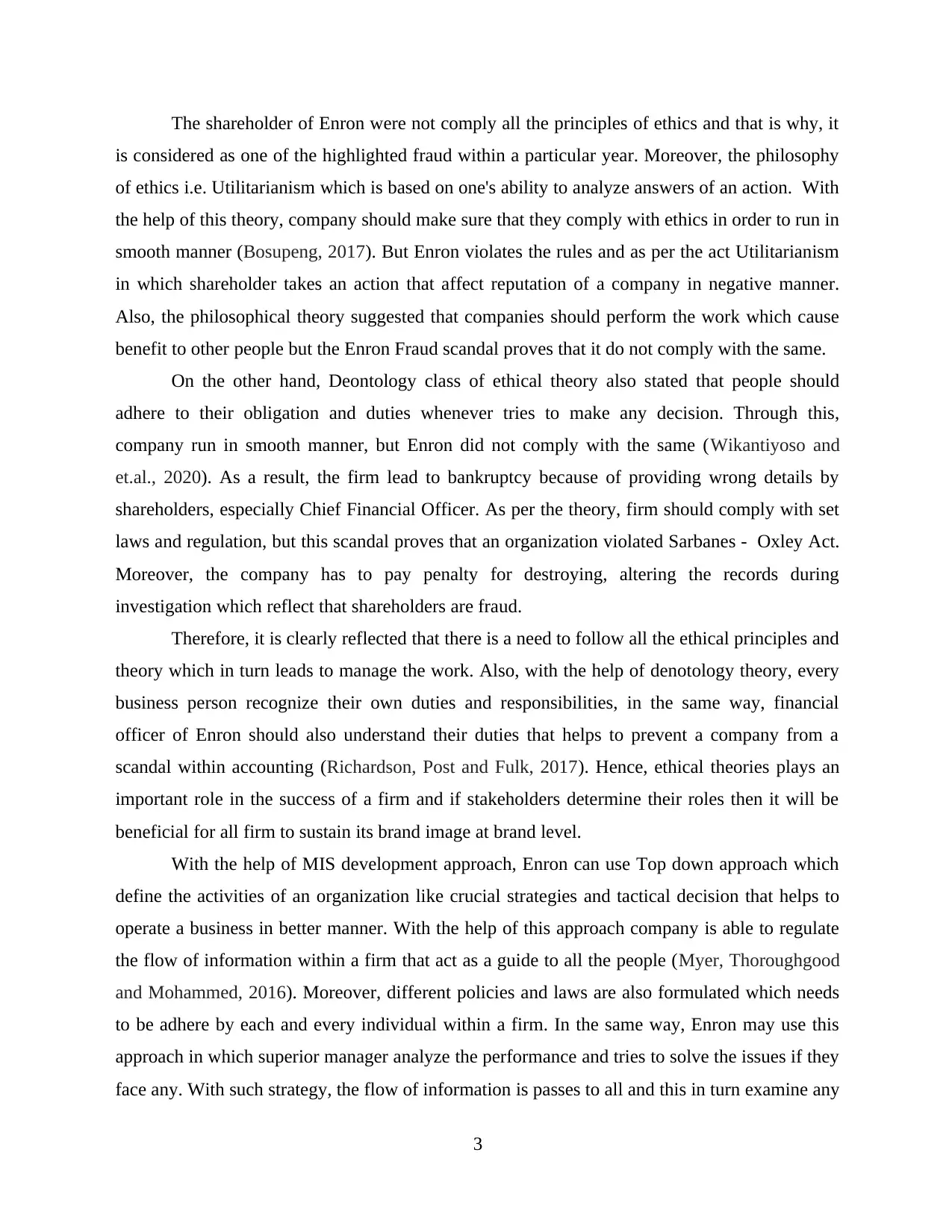
The shareholder of Enron were not comply all the principles of ethics and that is why, it
is considered as one of the highlighted fraud within a particular year. Moreover, the philosophy
of ethics i.e. Utilitarianism which is based on one's ability to analyze answers of an action. With
the help of this theory, company should make sure that they comply with ethics in order to run in
smooth manner (Bosupeng, 2017). But Enron violates the rules and as per the act Utilitarianism
in which shareholder takes an action that affect reputation of a company in negative manner.
Also, the philosophical theory suggested that companies should perform the work which cause
benefit to other people but the Enron Fraud scandal proves that it do not comply with the same.
On the other hand, Deontology class of ethical theory also stated that people should
adhere to their obligation and duties whenever tries to make any decision. Through this,
company run in smooth manner, but Enron did not comply with the same (Wikantiyoso and
et.al., 2020). As a result, the firm lead to bankruptcy because of providing wrong details by
shareholders, especially Chief Financial Officer. As per the theory, firm should comply with set
laws and regulation, but this scandal proves that an organization violated Sarbanes - Oxley Act.
Moreover, the company has to pay penalty for destroying, altering the records during
investigation which reflect that shareholders are fraud.
Therefore, it is clearly reflected that there is a need to follow all the ethical principles and
theory which in turn leads to manage the work. Also, with the help of denotology theory, every
business person recognize their own duties and responsibilities, in the same way, financial
officer of Enron should also understand their duties that helps to prevent a company from a
scandal within accounting (Richardson, Post and Fulk, 2017). Hence, ethical theories plays an
important role in the success of a firm and if stakeholders determine their roles then it will be
beneficial for all firm to sustain its brand image at brand level.
With the help of MIS development approach, Enron can use Top down approach which
define the activities of an organization like crucial strategies and tactical decision that helps to
operate a business in better manner. With the help of this approach company is able to regulate
the flow of information within a firm that act as a guide to all the people (Myer, Thoroughgood
and Mohammed, 2016). Moreover, different policies and laws are also formulated which needs
to be adhere by each and every individual within a firm. In the same way, Enron may use this
approach in which superior manager analyze the performance and tries to solve the issues if they
face any. With such strategy, the flow of information is passes to all and this in turn examine any
3
is considered as one of the highlighted fraud within a particular year. Moreover, the philosophy
of ethics i.e. Utilitarianism which is based on one's ability to analyze answers of an action. With
the help of this theory, company should make sure that they comply with ethics in order to run in
smooth manner (Bosupeng, 2017). But Enron violates the rules and as per the act Utilitarianism
in which shareholder takes an action that affect reputation of a company in negative manner.
Also, the philosophical theory suggested that companies should perform the work which cause
benefit to other people but the Enron Fraud scandal proves that it do not comply with the same.
On the other hand, Deontology class of ethical theory also stated that people should
adhere to their obligation and duties whenever tries to make any decision. Through this,
company run in smooth manner, but Enron did not comply with the same (Wikantiyoso and
et.al., 2020). As a result, the firm lead to bankruptcy because of providing wrong details by
shareholders, especially Chief Financial Officer. As per the theory, firm should comply with set
laws and regulation, but this scandal proves that an organization violated Sarbanes - Oxley Act.
Moreover, the company has to pay penalty for destroying, altering the records during
investigation which reflect that shareholders are fraud.
Therefore, it is clearly reflected that there is a need to follow all the ethical principles and
theory which in turn leads to manage the work. Also, with the help of denotology theory, every
business person recognize their own duties and responsibilities, in the same way, financial
officer of Enron should also understand their duties that helps to prevent a company from a
scandal within accounting (Richardson, Post and Fulk, 2017). Hence, ethical theories plays an
important role in the success of a firm and if stakeholders determine their roles then it will be
beneficial for all firm to sustain its brand image at brand level.
With the help of MIS development approach, Enron can use Top down approach which
define the activities of an organization like crucial strategies and tactical decision that helps to
operate a business in better manner. With the help of this approach company is able to regulate
the flow of information within a firm that act as a guide to all the people (Myer, Thoroughgood
and Mohammed, 2016). Moreover, different policies and laws are also formulated which needs
to be adhere by each and every individual within a firm. In the same way, Enron may use this
approach in which superior manager analyze the performance and tries to solve the issues if they
face any. With such strategy, the flow of information is passes to all and this in turn examine any
3
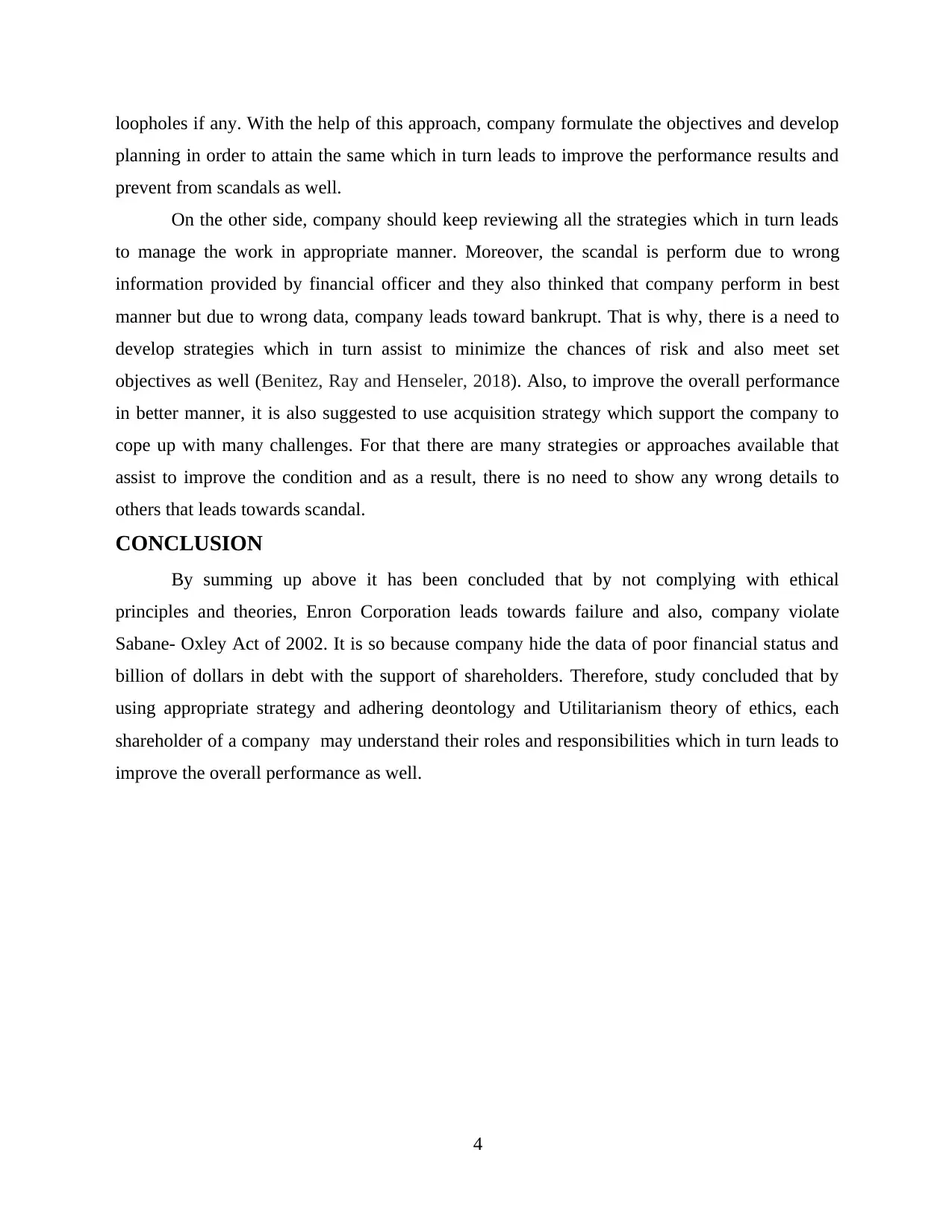
loopholes if any. With the help of this approach, company formulate the objectives and develop
planning in order to attain the same which in turn leads to improve the performance results and
prevent from scandals as well.
On the other side, company should keep reviewing all the strategies which in turn leads
to manage the work in appropriate manner. Moreover, the scandal is perform due to wrong
information provided by financial officer and they also thinked that company perform in best
manner but due to wrong data, company leads toward bankrupt. That is why, there is a need to
develop strategies which in turn assist to minimize the chances of risk and also meet set
objectives as well (Benitez, Ray and Henseler, 2018). Also, to improve the overall performance
in better manner, it is also suggested to use acquisition strategy which support the company to
cope up with many challenges. For that there are many strategies or approaches available that
assist to improve the condition and as a result, there is no need to show any wrong details to
others that leads towards scandal.
CONCLUSION
By summing up above it has been concluded that by not complying with ethical
principles and theories, Enron Corporation leads towards failure and also, company violate
Sabane- Oxley Act of 2002. It is so because company hide the data of poor financial status and
billion of dollars in debt with the support of shareholders. Therefore, study concluded that by
using appropriate strategy and adhering deontology and Utilitarianism theory of ethics, each
shareholder of a company may understand their roles and responsibilities which in turn leads to
improve the overall performance as well.
4
planning in order to attain the same which in turn leads to improve the performance results and
prevent from scandals as well.
On the other side, company should keep reviewing all the strategies which in turn leads
to manage the work in appropriate manner. Moreover, the scandal is perform due to wrong
information provided by financial officer and they also thinked that company perform in best
manner but due to wrong data, company leads toward bankrupt. That is why, there is a need to
develop strategies which in turn assist to minimize the chances of risk and also meet set
objectives as well (Benitez, Ray and Henseler, 2018). Also, to improve the overall performance
in better manner, it is also suggested to use acquisition strategy which support the company to
cope up with many challenges. For that there are many strategies or approaches available that
assist to improve the condition and as a result, there is no need to show any wrong details to
others that leads towards scandal.
CONCLUSION
By summing up above it has been concluded that by not complying with ethical
principles and theories, Enron Corporation leads towards failure and also, company violate
Sabane- Oxley Act of 2002. It is so because company hide the data of poor financial status and
billion of dollars in debt with the support of shareholders. Therefore, study concluded that by
using appropriate strategy and adhering deontology and Utilitarianism theory of ethics, each
shareholder of a company may understand their roles and responsibilities which in turn leads to
improve the overall performance as well.
4
⊘ This is a preview!⊘
Do you want full access?
Subscribe today to unlock all pages.

Trusted by 1+ million students worldwide
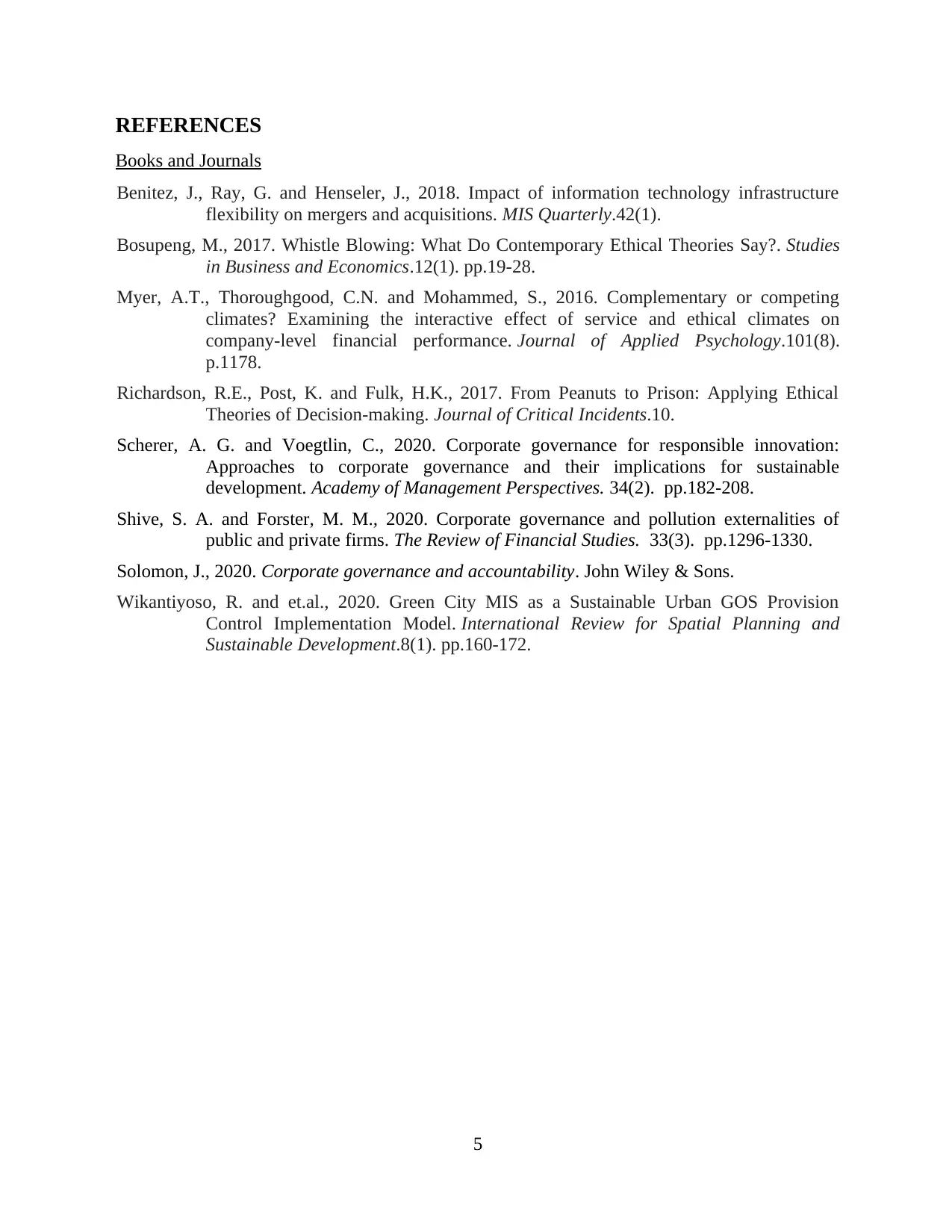
REFERENCES
Books and Journals
Benitez, J., Ray, G. and Henseler, J., 2018. Impact of information technology infrastructure
flexibility on mergers and acquisitions. MIS Quarterly.42(1).
Bosupeng, M., 2017. Whistle Blowing: What Do Contemporary Ethical Theories Say?. Studies
in Business and Economics.12(1). pp.19-28.
Myer, A.T., Thoroughgood, C.N. and Mohammed, S., 2016. Complementary or competing
climates? Examining the interactive effect of service and ethical climates on
company-level financial performance. Journal of Applied Psychology.101(8).
p.1178.
Richardson, R.E., Post, K. and Fulk, H.K., 2017. From Peanuts to Prison: Applying Ethical
Theories of Decision-making. Journal of Critical Incidents.10.
Scherer, A. G. and Voegtlin, C., 2020. Corporate governance for responsible innovation:
Approaches to corporate governance and their implications for sustainable
development. Academy of Management Perspectives. 34(2). pp.182-208.
Shive, S. A. and Forster, M. M., 2020. Corporate governance and pollution externalities of
public and private firms. The Review of Financial Studies. 33(3). pp.1296-1330.
Solomon, J., 2020. Corporate governance and accountability. John Wiley & Sons.
Wikantiyoso, R. and et.al., 2020. Green City MIS as a Sustainable Urban GOS Provision
Control Implementation Model. International Review for Spatial Planning and
Sustainable Development.8(1). pp.160-172.
5
Books and Journals
Benitez, J., Ray, G. and Henseler, J., 2018. Impact of information technology infrastructure
flexibility on mergers and acquisitions. MIS Quarterly.42(1).
Bosupeng, M., 2017. Whistle Blowing: What Do Contemporary Ethical Theories Say?. Studies
in Business and Economics.12(1). pp.19-28.
Myer, A.T., Thoroughgood, C.N. and Mohammed, S., 2016. Complementary or competing
climates? Examining the interactive effect of service and ethical climates on
company-level financial performance. Journal of Applied Psychology.101(8).
p.1178.
Richardson, R.E., Post, K. and Fulk, H.K., 2017. From Peanuts to Prison: Applying Ethical
Theories of Decision-making. Journal of Critical Incidents.10.
Scherer, A. G. and Voegtlin, C., 2020. Corporate governance for responsible innovation:
Approaches to corporate governance and their implications for sustainable
development. Academy of Management Perspectives. 34(2). pp.182-208.
Shive, S. A. and Forster, M. M., 2020. Corporate governance and pollution externalities of
public and private firms. The Review of Financial Studies. 33(3). pp.1296-1330.
Solomon, J., 2020. Corporate governance and accountability. John Wiley & Sons.
Wikantiyoso, R. and et.al., 2020. Green City MIS as a Sustainable Urban GOS Provision
Control Implementation Model. International Review for Spatial Planning and
Sustainable Development.8(1). pp.160-172.
5
1 out of 7
Related Documents
Your All-in-One AI-Powered Toolkit for Academic Success.
+13062052269
info@desklib.com
Available 24*7 on WhatsApp / Email
![[object Object]](/_next/static/media/star-bottom.7253800d.svg)
Unlock your academic potential
Copyright © 2020–2026 A2Z Services. All Rights Reserved. Developed and managed by ZUCOL.





